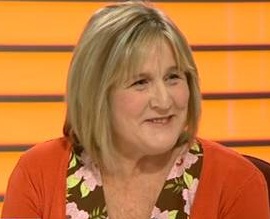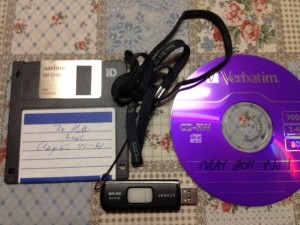 It was fantastic. I’m not quite sure how Channel Ten Sydney came to approach the Adelaide BC group but bookcrosser Newk put up the information at BCAUS, the yahoo BookCrossing group, that the station was looking for bookcrossers. Yours truly, never backward in coming forward, put up her hand and also contacted the station.
It was fantastic. I’m not quite sure how Channel Ten Sydney came to approach the Adelaide BC group but bookcrosser Newk put up the information at BCAUS, the yahoo BookCrossing group, that the station was looking for bookcrossers. Yours truly, never backward in coming forward, put up her hand and also contacted the station.
Eve Neylon the segment producer was wonderful and the online intro the station put together to explain BookCrossing to the general public was one of the best examples I’ve seen. BookCrossing really is a parallel universe. It is a tricky thing to explain in a few minutes but the bottom line is that www.bookcrossing.com is about sharing books. If you love books and want to share books with others, read reviews of your favourite books, meetup with people to discuss books and even receive books in the mail from faraway places then BookCrossing is definitely for you.
For me discovering the site has literally changed my life. I have not only been to 4 conventions: Adelaide, SA in 2006, London in 2008, Greece in 2008 and the Sydney Unconvention in 2010 but it has also inspired me to write my second published novel Crossing Paths: the BookCrossing Novel.
One of the questions my interviewer Paul Henry was going to ask me was how did I get into BookCrossing. Well, a week before Christmas in 2003 I saw an ad in an Australian Publications mag about the site and immediately I was intrigued. I couldn’t wait to get home and sus it all out!
After an hour or two going over the site (it is a very comprehensive with a lot to take in) I immediately realised “This is so me.” I love books and I love synchronicity and BookCrossing is about both. After a little while I also realised that BookCrossing was also a book – a book that I could write. I remember working out that amazingly people can be tracked through BookCrossing. And you could also anticipate where people might be travelling to next, by the books on their “virtual” bookshelf.
I also remember, within a day of discovering BookCrossing, studying my “real” bookshelf to try and work out what books my character would take with her and how many. I initially decided on 10 but then lowered it to eight to allow for books she might pick up on the way. Also important was where she was going to release the books and so began my journey of writing a book inspired by an online bookclub, the doorstopper that I managed to hold up in my TV interview, as you can see for yourself. http://www.youtube.com/watch?v=3PAqoC94Sis
Doing the interview was a wonderful insight into how segments are produced. Eve was very thorough. First interviewing me by phone, keeping in touch by email, phoning me again to confirm the appointment, asking more questions and a day or so before emailing me with background information that the interviewer would be reading to prepare themselves (Paul Henry as it turned out) for the segment and questions they would be asking to give me a chance to put together my best answers.
We only had three minutes and because the station decided on producing a small online intro to BookCrossing, that freed Paul up to ask different questions. He asked one or two on the list but the rest were dictated by his curiousity and the way the conversation went. Although he did interrupt a bit I’m glad he did because that’s how we managed to cover quite a lot in in such a short timespan.
I’m so grateful to have had the opportunity to do the interview. It was such an enjoyable experience. I was lucky to have my friend Gina drive down with me from Newcastle and she was allowed to sit offscreen and watch the segment. Everyone was so friendly – the makeup girls, Lana, Eve, Paul and Kath. Thank you Channel 10! It was fun!

